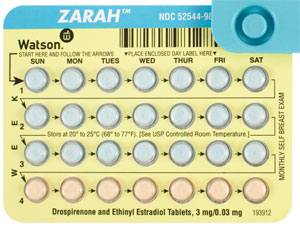Zarah Dosage
Generic name: Drospirenone 3mg, Ethinyl Estradiol 0.03mg;
Dosage form: tablets
Drug class: Contraceptives
Medically reviewed by Drugs.com. Last updated on Nov 15, 2024.
How to Take Zarah
Take one tablet by mouth at the same time every day. The failure rate may increase when pills are missed or taken incorrectly.
To achieve maximum contraceptive effectiveness, Zarah must be taken as directed, in the order directed on the blister pack. Single missed pills should be taken as soon as remembered.
How to Start Zarah
Instruct the patient to begin taking Zarah either on the first day of her menstrual period (Day 1 Start) or on the first Sunday after the onset of her menstrual period (Sunday Start).
Day 1 Start
During the first cycle of Zarah use, instruct the patient to take one blue Zarah daily, beginning on Day 1 of her menstrual cycle. (The first day of menstruation is Day 1.) She should take one blue Zarah daily for 21 consecutive days, followed by one peach tablet daily on Days 22 through 28. Zarah should be taken in the order directed on the package at the same time each day, preferably after the evening meal or at bedtime with some liquid, as needed. Zarah can be taken without regard to meals. If Zarah is first taken later than the first day of the menstrual cycle, Zarah should not be considered effective as a contraceptive until after the first 7 consecutive days of product administration. Instruct the patient to use a non-hormonal contraceptive as back-up during the first 7 days. The possibility of ovulation and conception prior to initiation of medication should be considered.
Sunday Start
During the first cycle of Zarah use, instruct the patient to take one blue Zarah daily, beginning on the first Sunday after the onset of her menstrual period. She should take one blue Zarah daily for 21 consecutive days, followed by one peach tablet daily on Days 22 through 28. Zarah should be taken in the order directed on the package at the same time each day, preferably after the evening meal or at bedtime with some liquid, as needed. Zarah can be taken without regard to meals. Zarah should not be considered effective as a contraceptive until after the first 7 consecutive days of product administration. Instruct the patient to use a non-hormonal contraceptive as back-up during the first 7 days. The possibility of ovulation and conception prior to initiation of medication should be considered.
The patient should begin her next and all subsequent 28-day regimens of Zarah on the same day of the week that she began her first regimen, following the same schedule. She should begin taking her blue tablets on the next day after ingestion of the last peach tablet, regardless of whether or not a menstrual period has occurred or is still in progress. Anytime a subsequent cycle of Zarah is started later than the day following administration of the last peach tablet, the patient should use another method of contraception until she has taken a blue Zarah daily for seven consecutive days.
When switching from a different birth control pill
When switching from another birth control pill, Zarah should be started on the same day that a new pack of the previous oral contraceptive would have been started.
When switching from a method other than a birth control pill
When switching from a transdermal patch or vaginal ring, Zarah should be started when the next application would have been due. When switching from an injection, Zarah should be started when the next dose would have been due. When switching from an intrauterine contraceptive or an implant, Zarah should be started on the day of removal.
Withdrawal bleeding usually occurs within 3 days following the last blue tablet. If spotting or breakthrough bleeding occurs while taking Zarah, instruct the patient to continue taking Zarah by the regimen described above. Counsel her that this type of bleeding is usually transient and without significance; however, advise her that if the bleeding is persistent or prolonged, she should consult her healthcare provider.
Although the occurrence of pregnancy is low if Zarah is taken according to directions, if withdrawal bleeding does not occur, consider the possibility of pregnancy. If the patient has not adhered to the prescribed dosing schedule (missed one or more active tablets or started taking them on a day later than she should have), consider the possibility of pregnancy at the time of the first missed period and take appropriate diagnostic measures. If the patient has adhered to the prescribed regimen and misses two consecutive periods, rule out pregnancy. Discontinue Zarah if pregnancy is confirmed.
The risk of pregnancy increases with each active blue tablet missed. For additional patient instructions regarding missed pills, see the "WHAT TO DO IF YOU MISS PILLS" section in the FDA-Approved Patient Labeling. If breakthrough bleeding occurs following missed tablets, it will usually be transient and of no consequence. If the patient misses one or more peach tablets, she should still be protected against pregnancy provided she begins taking a new cycle of blue tablets on the proper day.
For postpartum women who do not breastfeed or after a second trimester abortion, start Zarah no earlier than 4 weeks postpartum due to the increased risk of thromboembolism. If the patient starts Zarah postpartum and has not yet had a period, evaluate for possible pregnancy, and instruct her to use an additional method of contraception until she has taken Zarah for 7 consecutive days.
More about Zarah (drospirenone / ethinyl estradiol)
- Check interactions
- Compare alternatives
- Reviews (84)
- Drug images
- Side effects
- During pregnancy
- Drug class: contraceptives
- En español
Patient resources
Other brands
Yaz, Yasmin, Ocella, Loryna, ... +6 more
Professional resources
Other brands
Yaz, Yasmin, Ocella, Loryna, ... +7 more
Related treatment guides
Further information
Always consult your healthcare provider to ensure the information displayed on this page applies to your personal circumstances.


